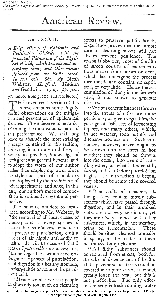 ―289― ―289―
American Review.
Art. XXVII.
A Brief History of Epidemic and
Pestilential Diseases; with the
principal Phenomena of the Physi-
cal World, which precede and ac-
company them; and Observations
deduced from the Facts stated.
In two vols. 8vo. By Noah
Webster. Hartford. Hudson
and Goodwin. 1799. pp. 700.
[Continued from p.213, and concluded.]
THE seventeenth section of this
work contains some highly
useful observations on the mitiga-
tion and prevention of epidemical
diseases. These deserve to be rank-
ed among the most valuable parts of
this performance. We shall beg
leave to abstract the most striking
precepts contained in this section,
believing it our duty to diffuse, as
widely as possible, knowledge of
such great and general benefit; and
to adopt the words of our author
rather than employ our own, since
the style and spirit of a book are
best displayed by the production of
actual specimens; and since, in this
case, our author's mode of compo-
sition is eminently cogent and per-
suasive.
The suitable antidote to pesti-
lence, according to Mr. Webster, is
“the removal of all local causes of
disease; such as every species of
putrescible substances, which, in
the process of putrefaction, emit a
species of air highly unfriendly to
health. It will be observed that I
speak of putrescible substances; for,
flesh or vegetables, which have un-
dergone the process of putrefaction,
or of digestion in a healthy stomach,
discharge little or none of the perni-
cious acid.
“Hence we observe that people
in cities rely too much on cleansing
streets to preserve public health.
Experience proves that the utmost
care in cleansing streets will not
always prevent pestilence. The
reason is obvious; most of the filth
of streets consists of excrementi-
tious matter from horses or oxen,
which has undergone the process
mentioned, and contains no septic
acid, or very little. Hence the ac-
cumulation of dung in the farmer's
yard, is not known to generate
diseases.
“Various other substances thrown
into the streets of cities are more
pernicious; as green vegetables, the
garbage of fish, lees of fermenting
liquors, and many others, which,
in hot weather, soon putrefy and
discharge noxious air. Such sub-
stances, however, never ought to
be thrown into the street in hot
weather; they should be thrown
into the ocean, into rivers of run-
ning water, or what is better still,
buried, and that before putrefaction
begins. If putrefaction is begun,
they should be removed in covered
vessels.
“The vaults of cloacina, al-
though they contain mostly sub-
stances which have passed through
digestion, and in their unmixed
state, are not very pernicious, yet
they are always mixed with other
substances, which, in hot weather,
bring on fermentation. These
should be either cleansed annually
in spring, or the matter in them
neutralized by quick-lime.
“All filthy substances should
be removed from streets, both for
the sake of decency and of health.
If the pavements of streets could be
covered with pure earth, it would
greatly lessen the heat; but this is
not practicable. The only effec-
tual remedy is fresh running water
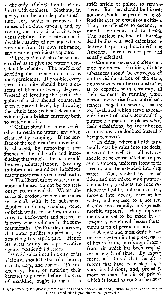 ―290― ―290―
—the only article that unites clean-
liness with coolness. Nothing, in
a city, can be an adequate substi-
tute; for, while it removes the
causes of noxious vapours, and, by
cooling the sultry air of a city, pre-
vents debility, it extricates a consi-
derable quantity of new and whole-
some air from its own substance,
and absorbs pernicious vapours.
“Streets should also be so con-
structed as to give the water a con-
siderable velocity. The practice of
levelling the surface of a city is
most pernicious. If possible, every
street in a city should have a de-
scent of fifteen or twenty degrees.
Instead of levelling the earth, the
police of a city should counteract
even a natural level, by throwing
the whole into artificial elevations;
which give a brisker currency both
to water and air.
“Cellars should be so construct-
ed as to retain no water; and often
cleansed by scraping. If the sur-
face of the cellar can be convenient-
ly changed, by removing a few
inches of the old earth and intro-
ducing that which is fresh, it would
be a very salutary labour. Nothing
imbibes and neutralizes infectious
matter more readily than fresh earth.
“The liberal use of water, in and
about a house, cannot be too seri-
ously recommended. Water ab-
sorbs all noxious matter that comes
in contact with it in substance.
Applied to floors, wooden, stone,
or brick walls, to clothes, to furni-
ture, to back-yards and streets, it
is every where salutary in the sum-
mer months. Dr. Priestley observes,
that water purifies vitiated air, by
absorbing the septic part. Hence
its great utility as a preservative
against pestilential diseases.
“All dead animals in a city, or its
vicinity, should be buried or burnt;
as cats, dogs, and horses. The in-
decency, alone, of suffering their
carcases to putrefy before the eyes
of mankind, ought to make it a
strict article of police, to remove
them. But they should be buried;
not one should be permitted to of-
fend the eyes or nostrils of a citizen.
They are offensive to decency, to
moral sentiments, and to health.
The ancient method of burning
dead bodies was well calculated to
destroy the poison; but, in Atlantic
America, burial is cheaper and
equally effectual.
“Common sewers are often com-
mon nuisances. In cities, all filthy
substances should be conveyed off
on the visible surface of the earth,
unless sewers can be so constructed
as to deposit, with certainty, all
their contents in running water.
Serious evils arise from putrid sub-
stances lodged in sewers, that are
too level, and which serve as reser-
voirs instead of canals, accumulating
putrescible matters in places where
their exhalations, by the influence
of moisture, are doubled instead of
being removed.
“In cities, where all filth is na-
turally cast by rains into the docks,
it would be well that all wharves
should be so constructed as to pre-
sent a smooth, uniform front to the
stream, and be extended into deep
water. Mud, washed by the salt
tides, and not mixed with putresci-
ble matters, produces no inconve-
nience to health; but such matters,
thrown into docks, bare at low
water, and exposed to a hot sun,
dissolve most rapidly, and generate
morbid vapours. Many improve-
ments are yet to be made in our
sea-ports, which will lessen the ac-
cumulation of pernicious air.
“A great and most desirable ar-
ticle in a system for the preservation
of health, is the purifying of rooms
from air which has been respired
for a length of time. By experi-
ment, it is found that the air of
rooms that have been slept in, is
very insalubrious; and, probably,
more so than the air of privies,
which is found to contain less nox-
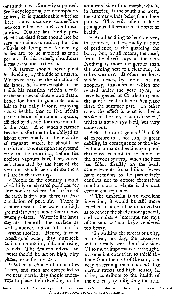 ―291― ―291―
ious air than was formerly supposed.
See Encyclopaedia, art atmosphere.
Indeed, it is questionable whether
there is any necessary connection
between offensive smells and insa-
lubrity. Nature has kindly pro-
vided that dead feces should not be
very pernicious to health; but the
effluvia of living and fermenting
bodies are to be avoided as rank
poison. In this respect, cleanliness
is made essential to health.
“A farmer should never plant
his dwelling by the side of a marsh.
Whatever may be the situation of
his lands, he is inexcusable if he
builds his mansion within a mile
of the sources of disease and death.
Better for him to go a mile and a
half to his daily labour, enjoying
robust health, than to live within
the circulation of poisonous vapours,
afflicted by diseases for three months
in the year. And when a farmer
has the misfortune to be obliged to
labour occasionally in the vicinity
of stagnant water, he should be
careful not to enter upon the ground
early in the morning, before the
noxious vapours have been raised
and attenuated by the heat of the
sun; nor should he continue there
till late in the evening.
“People in the country should
select hilly or elevated positions for
their houses; where the surface of
the earth is dry, and there is a free
circulation of pure air. There is
another reason—the water on high
grounds is always better than in low,
swampy places. Water in flat lands
stagnates beneath the surface as
well as above; but on hills, it is in
constant motion. Hence, if men
expect good water, they must seek
for it on mountains, hills, and rising
grounds. The Arabians advise that
houses should be set on high, airy
places, near fresh water.
“When a choice of difficulties
occurs, and men are compelled to
live near marsh, they should endea-
vour to place their dwelling on the
windward side of the marsh, which,
in America, is the south and west;
the summer winds being from these
points. This will often make a
prodigious difference in the state of
health.
“Another thing to be observed,
in summer, and especially in time
of pestilence, is the guarding the
body; but, by all means, the head,
from the direct rays of the sun.
Nothing is more dangerous than
the buruing heat of a clear sun, in
sultry weather. It often produces
sudden death, by means of an
apoplexy, instances of which are
related under the year 1752, to
have happened at Charleston; and
the same is said to have taken place
there the summer past. In other
cases, the effect is what is called a
stroke of the sun, “coup du soleil,”
which is not always fatal, but very
dangerous.
“But the most general ill effect
of exposure to a hot sun, is great
debility, in consequence of the vio-
lent and unnatural excitement; and
this effect is most to be found in
the nervous system, when the heat
has fallen directly on the head.
Convalescents from bilious fevers
have occasion to be particularly
cautious not to expose themselves
to a hot sun; a relapse is the most
certain consequence.
“The umbrella is an excellent
invention; it would be still more
excellent if it could be improved so
as to render the shade more general,
and completely interrupt the rays
of the sun, without being rendered
too heavy.
“In walking the streets of a city,
in a clear, hot day, the passenger
will naturally seek the shady side.
Of so much importance is it thought,
in some hot countries, to shield the
body from the rays of the sun, that
very discerning men contend that
narrow streets and high houses, in
cities, contribute to the health of
the citizens, by mitigating the heat.
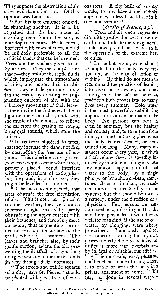 ―292― ―292―
They suppose the obstruction of air
a less evil than a hot sun. Of this
opinion was Lancisius.
“But this is to embrace one evil
in shunning another. It is to be
regretted that the best mode of
shielding man from a hot sun, is
not adopted in cities. Wide streets,
bordered with rows of trees, would
be infinitely preferable to all the
artificial shades that can be invented.
Trees are the coolers given to us
by nature. They make a pleasant
shade—they imbibe the septic fluids
which impregnate the atmosphere
of cities, and poison their inhabi-
tants—they exhale pure air—they
fan the earth, by creating or aug-
menting currents of air, with the
vibratory movement of their leaves
—they invite the feathered tribe to
light on their branches, and, with
the music of their notes, to relieve
the ear from the grating of rough,
unnatural sounds, which stun the
citizen.
“It has been objected to trees,
that they increase the danger of fire,
by obstructing the free use of en-
gines. This objection is imaginary.
Few cases would occur where trees,
properly placed, could interfere
with the operations of extinguish-
ing fire; and, in such cases, they
might be levelled in a moment.
“It has also been objected, that
trees obstruct the free circulation
of air. This is not true. In calm
summer weather, they very much
increase a light breeze, by partly
obstructing the upper current with
their branches, and throwing more
air below, thus augmenting the un-
der current on the surface of the
earth, where it is wanted. The
leaves and branches also, by their
gentle motion, agitate the air, pre-
venting the ill effects of stagnation;
and give velocity to the air that finds
its way through their interstices.
“The streets and public squares
of a city,” says St. Pierre, ‘should
be planted with great trees of vari-
ous sorts. A city built of marble,
would, to me, have a melancholy
appearance, unless I could see in it
trees and verdure.’
[Studies of Nature, 13.]
“Trees and all green vegetables
diminish greatly the heat near the
earth; and little do men, in general,
think how prejudicial to health is
the operation of the extreme heat
of cities.
“In the hot season, water should
be applied to the body very fre-
quently, in the way of lotion or
bathing. By this I do not mean to
recommend the practice of leaping
into river or sea-water, and con-
tinuing in it for half an hour—a
practice which proves fatal to many
lives every summer. Cold water
is the most powerfully debilitating
application that can be made to the
body. No persons can bear it,
even in summer, but the healthy
and robust; and, to save such from
injury, it must not be applied when
the body is over-heated, or con-
tinued too long. Many, many in-
stances occur every year, in which
a fatal yellow fever is speedily in-
duced by injudicious plunging. An
instantaneous application of cool
water to the body, by a single
plunge, or by a shower-bath, some-
times acts as a stimulant, by a sud-
den increase of excitability in the
system; but this should be used as
a remedy, under the direction of a
physician. Few persons can sus-
tain the shock, unless in good health;
and I am persuaded it would be as
well for mankind, if the use of cold
water, by plunging, were wholly
proscribed. Judicously applied,
it is sometimes useful; but my own
observations lead me to believe, the
utility is more than overbalanced
by its fatal or mischievous effects.
“The most safe, easy, pleasant,
and beneficial mode of using water,
is to bathe or wash the body in a
private apartment at home. This
may be done in several ways—
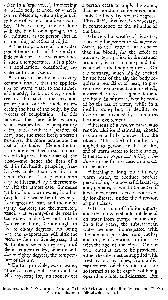 ―293― ―293―
either in a large vessel, immersing
the whole body at once, or what is
less troublesome, with a single pail
or bowl of water, in a bed-cham-
ber. The washing may be done
with the hand, or a sponge, in a
few minutes, as the person rises in
the morning or retires at night.
“The temperature of the water
should be near that of the blood; a
little cooler or a little warmer, and,
in such a temperature, it is a plea-
sant application, occasioning no
violence to the system.
“It may not be obvious to every
common reader, that the applica-
tion of warm water to the surface
of the body, in a hot day, should
cool it. But such is the fact, and
nature points out this mode of re-
ducing the heat of the body, by the
process of perspiration. In this
process, the insensible vapour,
which escapes by the perspiratory
ducts, takes with it a portion of
heat; and, the more freely a person
perspires, the more temperate the
heat of his body. Hence the hu-
man body is enabled to sustain heat
several degrees above that of the
blood—and hence the flesh of a
child in full health, perspiring free-
ly, feels cooler than the air, in a
summer's day. This phenomenon
may be illustrated by a thermome-
ter with the utmost ease. Immerse
the bulb into warm water, in a hot
day; let the water be of seventy-
five degrees of heat, and the air of
eighty degrees; the thermometer,
standing at seventy-five degrees in
the water, and taken out into a
warmer medium, the air ought to
rise to eighty degrees; but being
wet, the evaporation will sink the
mercury four or five degrees; that
is, to about seventy degrees, until
the instrument is dry, when it will
rise to eighty degrees, the tempera-
ture of the air.
“On this principle, warm water,
as well as cool, will lessen the heat
of the system; for, no sooner does
a person cease to apply the water,
than evaporation commences, and
cools the body by several degrees.
This effect, however, is temporary,
in consequence of the stimulus of
the heat.
“In very hot weather, it is better,
especially for persons in the vigour of
health, to use water a little cooler
than the blood; for the effect of
warm water, applied in the manner
proposed, is to stimulate; and this
is not what the body requires. On
the contrary, when highly excited
by the heat of the air, the body re-
quires a reduction of heat, to pre-
vent over-excitement, and its effect,
indirect debility. In general, then,
the body, in summer, is to be cool-
ed by the use of water, while in a
healthy state; but, if debility or
disease has invaded it, it requires
heat and excitement.
“Persons of a slender habit, who
require additional stimulus, should
use water a little warmer than the
blood. The effect of cool water,
applied to persons in full health,
and of warm water to feeble habits,
is the same; to prevent debility; in-
direct in the former case, and direct
in the latter.
“Bathing a long time in very
warm water, to produce profuse
perspiration, is a powerful laxative;
and, perhaps, it would be better if
it was never used, except as a reme-
dy for disease, under the direction
of physicians.
“It is a point of infinite import-
ance that citizens should not depend
on water from pumps in the city.
In a few-years, the subterranean
water becomes impregnated with
the noxious particles from vaults;
and this evil continues to increase
with the age of the city. One of
two remedies are to be provided:
either the city must be supplied with
fresh water, by pipes, from a dis-
tant source, or the vaults must be
so formed as to be capable of being
opened in winter and cleansed. But
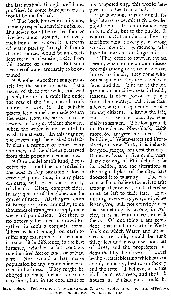 ―294― ―294―
the last method, though useful and
practised in some European cities,
would be ineffectual.
“The back houses in a city are,
in many respects, a terrible nuisance.
If a sewer could be carried four or
five feet under ground, and every
such house be set over it, a stream
of water passing through it from a
distant source, would be an excel-
lent means of cleansing a city from
this source of disease. But such
streams of water are rarely to be ob-
tained.
“Another expedient suggests it-
self for the same purpose. Let a
sewer of three feet wide, and well
paved, be run in a strait line under
the rear of the lots, and all back
houses set over it. In suitable
places, let channels be made to turn
the water from the streets into the
sewers, in long or violent showers,
when the water is not wanted to
wash the streets. In this manner,
the sewers might be washed perfect-
ly clean a number of times every
summer, and the citizens preserved
from their poisonous exhalations.
“On a model of this kind, I con-
ceive cities should be constructed in
the most healthy situations; for, a
crowded population, in any place
on earth, will lessen the salubrity
of the air. Close, compact cities,
in any quarter of the globe, are the
graves of men. All the great cities
of Europe require, annually, some
thousands of strangers to supply their
waste of population. Yet there is
no necessity for men to crowd to-
gether in such a compact form.
There is land enough on earth to
suffer any extension of cities; and
it makes little difference, in the first
instance, whether a lot contains
one hundred feet of land, or half an
acre. Nor would a less dense
population be any inconvenience to
men in business. They might be
obliged to walk further on some
occasions, but, in the cool shade of
my proposed city, this would be a
pleasure rather than a toil.
“It is wrong, it is criminal, for
legislatures to permit such crowded
population. It is a nuisance, not
only to cities, but to the public. It
is a truth, that numbers of lives are
sacrificed almost every year, among
worthy country gentlemen, who
have business in our large cities.
“They come to town in the hot
season, when no uncommon disease
prevails among the citizens who are
inured to the air; they come with-
out suspicion; they are seized with
fever and die. The air of the low
grounds in our cities, even in healthy
seasons, is often poison to people
from the country, and gives them
a fever, when no epidemic is visible
among citizens. I know the fact,
and it is a serious calamity, espe-
cially to seamen. The low grounds
in Providence, New-York, Balti-
more, &c. are great nuisances. The
building of Water-street and Front-
street, in New-York, it is believed
by good judges, has cost this city a
thousand lives in five or six years.
I say nothing of Philadelphia; for
its position, and the alterations in
the original plan of the city, have
doomed it to calamity. The citi-
zens will not believe the evil to arise
among themselves, and therefore
must be left to their fate. If re-
mitting fevers every year, and yellow
fever often, will not convince men
that something is wrong in their
city, it is in vain to reason with
them. Of one thing I am confi-
dent, that if all the earth in New-
York on which Water and Front-
streets are built, could be sunk
thirty feet under water without loss
of lives, and the proprietors in-
demnified by the citizens, it would
be the greatest blessing which heaven
could, in mercy, bestow on the city
and the state. I believe, also, that
if all the cross streets, and the back
houses in Philadelphia could be
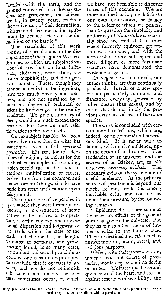 ―295― ―295―
levelled with the earth, and the
ground converted into flower-gar-
dens and grass-plots, the citizens
would, in twenty years, celebrate
the anniversary of their destruction,
with as much fervour as the repub-
licans in France celebrate the de-
molition of the bastile.”
The remainder of this work
consists of speculations on the dis-
appearance of the plague in Western
Europe, to which are subjoined va-
rious observations on lunar influ-
ence, electricity, venesection, va-
por or mephitic air, and the agen-
cy of comets. These, though they
cannot be denied to be ingenious,
have too much novelty and bold-
ness, and are not sustained by a
sufficient degree of technical or
scientific knowledge, to be readily
admitted. To give a summary of
them, would too much extend these
remarks. For these we must refer
the reader to the book itself.
On no subject has Mr. W. been
more adventrous than on what has
sometimes been called equivocal
generation. His zeal for the doc-
trines of religion, as well as for the
established principles of reasoning,
which forbid the needless and li-
centious multiplication of causes,
or deviation from the common and
known order of things, should have
made him tread with caution upon
this ground.
The appearance of vegetables in
spots where they were formerly un-
known, in consequence of some
change in the surface, or tempera-
ture, is ordinarily explained by the
casual dispersion and lodgment of
the seeds which the state of the
earth and the air has, at length,
permitted to germinate and grow.
Having found, in so many cases,
the seminal and sexual principle to
operate, one is naturally prompted
to conclude that it operates in all
cases, and we do not relinquish
this conclusion merely because
cases sometimes occur, in which
we have not been able to discover
traces of this operation. We are
more inclined to impute defects to
our own observation, or fallacy
to the evidence which we possess,
than to question the simplicity and
uniformity of Nature's laws, especi-
ally since we find, that in cases
where formerly equivocal genera-
tion was supposed, and with the
utmost plausibility, subsequent and
more diligent, or more fortunate
searchers have demonstrated the
existence of germs.
As vegetables, so animals, our
author thinks, are thus continually
produced. Insects of a new spe-
cies are particularly common, and
fishes are, every day, generated by
other means than sexual, and by
means that do not imply the pre-
vious existence of fish of the same
species.
The work is concluded with cer-
tain moral reflections, which are,
indeed, of an equivocal and hazard-
ous kind. It is never wise to
launch, with much confidence, up-
on the ocean of final causes. The
tendencies of an universe, and the
motives of its Maker, are, to this
observer, extremely evident. The
necessary evils of the system are of
useful tendency. As the primary
source of pestilence is beyond our
reach, he must rank this among
inevitable evils, and consoles us
under their pressure, by the follow-
ing remarks.
“Epidemic diseases are some of
the necessary effects of the general
laws that govern the universe. But
they have also a final cause of im-
mense value to the human race.
They are destined and calculated to
answer most important, moral, and
religious purposes.
“Men, with their present nature,
under a constant course of pros-
perity, would degenrate into devils
or brutes. Uninterrupted ease and
quiet contract the heart, and steel it
against emotions of sensibility: the
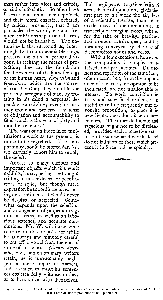 ―296― ―296―
man rushes into vices and crimes,
or sinks into sloth. So often have
I seen the hearts of men depraved,
and their moral character debased,
by sudden prosperity, that I am
persuaded the world, without fre-
quent inflictions of pain and distress,
would not be habitable. The na-
tural evils that surround us, inter-
mingled with innumerable blessings,
preserve the mind in perpetual vi-
gour, in seeking the means of pro-
tection; they lay the foundation
for the exercise of the finest feelings
of the human heart, compassion and
benevolence, which are the sources
of social virtue; they humble the
pride and arrogance of man, by cre-
ating in his mind a perpetual de-
pendance on divine power; in short,
they create and preserve that sense
of obligation and accountability to
God which is the germ of piety and
moral excellence.”
The want of an index in so mul-
tifarious a work as the present, is
much to be regretted. If an op-
portunity should be offered Mr. W.
we earnestly exhort him to supply
the defect.
Amidst so many curious and
important objects which this work
exhibits, it may, perhaps, be thought
trifling to notice defects or peculia-
rities of style; but though mere
expression be subordinate to reason-
ing and sentiment, it should never
be despised or neglected. Some-
what depends upon the selection
and arrangement of proper and sig-
nificant terms, as well as on labo-
rious searches, and accurate con-
clusions. Mr. W. will incur some
censure in this respect, for while
he is always and minutely careful
to cut off a vowel from the end of
some of his words, (famin, deter-
min, &c.) which ordinary writers
retain, he is unreasonably negli-
gent in more important matters,
and has failed to make his senten-
ces coalesce fully with each other,
or to harmonize with themselves.
This negligence, together with a
new scheme of quotation, gives the
first part of his work the air, less
of a scientific treatise, than of a
crude mass of memorandums, a
transcript of marginal notes, where,
for the sake of brevity, particles
and pronouns are dropped, and the
meaning conveyed by the use of
disconnected nouns and verbs.
With a few exceptions, however,
the composition is simple, unaf-
fected, and perspicuous. Diffuse-
ness and repetition of the same idea,
often occur; but, from the import-
ance of the truth, or opinion to be
inculcated, are not unallowable or
useless. To work conviction in
hasty and superficial readers, it is
useful to call up frequently our fa-
vourite proposition, to place it in
new lights, and adorn it with new
colours. The more deliberate and
sagacious ought not to be displeas-
ed, provided each successive exhi-
bition be somewhat diversified, and
do not fall short of those which pre-
cede it in force and perspicuity.
|